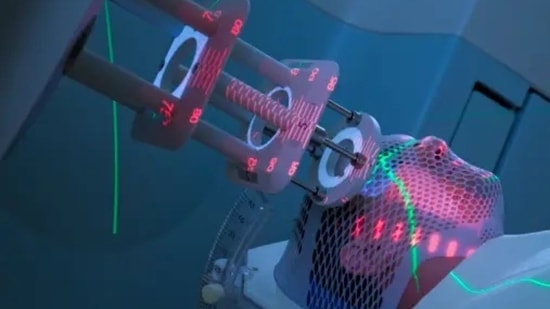
Role of radiotherapy intent in cancer care: Oncologist explains
9 months ago | 65 Views
Radiotherapy, also known as radiation therapy, is a type of cancer treatment where high doses of radiation are used to kill cancer cells and shrink tumours. In low doses, radiation is used in x-rays to detect the inside of the body, such as broken bones. In an interview with HT Lifestyle, Dr Prashant Nayak, associate consultant, Radiation Oncology, Punyashlok Ahilyadevi Holkar Head and Neck Cancer Institute of India (HNCII), said, “Radiotherapy is an essential treatment modality in cancer care. It employs high-energy X-ray beams to target and destroy cancer cells. The use-case for radiotherapy encompasses various sites with differing goals or intent of treatment.” The Oncologist further explained the types of intent in radiotherapy in cancer treatment.
Definitive intent radiotherapy:
Definitive intent radiotherapy is curative in nature - aiming to eliminate cancer cells and achieve long-term remission or cure. It is frequently employed as the primary treatment for localised cancers. This is employed when surgery is not preferred due to increased complication rates without any added benefits or when surgical removal is not possible. Definitive radiotherapy is used to treat cancers of the head-neck region, cervix, lung and oesophagus.
Curative intent radiotherapy:
Curative intent radiotherapy is delivered before or after surgery. Post-operative or adjuvant radiotherapy may be added despite complete cancer removal, to eliminate any remaining disease invisible to the naked eye. This is commonly practised in breast, brain and oral cancers. In the pre-operative or neoadjuvant setting, radiotherapy helps to shrink the tumour, increasing the chances of complete surgical removal while minimising the risk of damage. This is prevalent in oesophageal and rectal cancers as well as soft tissue sarcomas.
Non-curative or palliative intent radiotherapy:
Radiotherapy can also be used with a non-curative or palliative intent to alleviate symptoms and improve the quality of life in individuals with advanced or metastatic cancers. By targeting tumour deposits causing pain, bleeding, or obstructive symptoms, radiotherapy can provide significant relief and enhance patient comfort.
Read Also: can applying hair oil lead to hair loss?
#




















